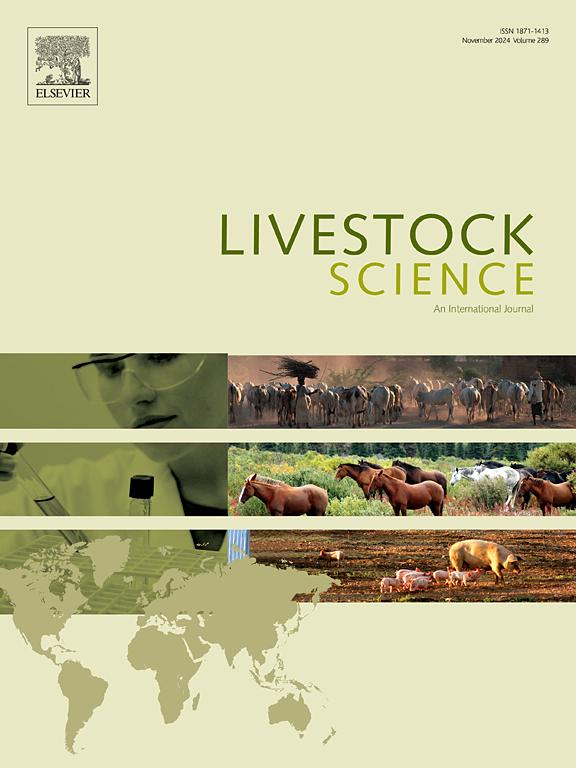在断奶后仔猪中,以jadinii Cyberlindnera酵母为蛋白质来源的饲粮与添加甲酸和益生菌的饲粮具有相当的益处
IF 1.9
3区 农林科学
Q2 AGRICULTURE, DAIRY & ANIMAL SCIENCE
引用次数: 0
摘要
畜牧业生产对可持续蛋白质来源的需求日益增加,因此必须评估能够在保持动物健康和生产性能的同时减少对环境影响的新型饲料成分。在商业化生产条件下,研究了用本地生产的微生物酵母蛋白Cyberlindnera jadinii代替豆粕对断奶仔猪日粮的影响。共有840头仔猪参加了连续3个生产期的田间试验。将仔猪分为2种饲粮处理:对照组饲粮中添加豆粕、甲酸产品和益生菌,试验组饲粮中添加贾氏酵母替代45%的饲粮蛋白质。在断奶后4周内评估生长性能、粪便稠度和肠道微生物群组成。总体而言,酵母基础饲粮的平均日增重(ADG; P < 0.01)和平均日采食量(ADFI; P < 0.01)低于对照组,但各组间饲料系数(FCR)基本一致。粪便稠度和腹泻临床症状均无差异,表明尽管采食量减少,但肠道健康仍保持正常。微生物群分析揭示了饮食对回肠和结肠微生物多样性和组成的影响。值得注意的是,酵母喂养的仔猪具有较高的约氏乳杆菌、溶食链球菌和普氏菌科成员的相对丰度,而对照喂养的仔猪具有较高的淀粉样乳杆菌和汉斯蓝杆菌的相对丰度。上述结果表明,jadinii酵母可以部分替代断奶猪饲粮中的豆粕和甲酸,而不会影响仔猪的健康状况,但会降低仔猪的生长性能。肠道微生物群的改变,包括有益类群如约氏乳杆菌的富集,表明肠道健康的功能调节,支持酵母蛋白作为猪生产系统中可持续饲料策略的潜力。本文章由计算机程序翻译,如有差异,请以英文原文为准。
A diet containing Cyberlindnera jadinii yeast as a protein source demonstrates comparable benefits to a formic acid and probiotic supplemented diet in post-weaning piglets
The increasing demand for sustainable protein sources in livestock production necessitates the evaluation of novel feed ingredients that can reduce environmental impact while maintaining animal health and performance. The effects of replacing soybean meal with Cyberlindnera jadinii, a locally produced microbial yeast protein, in the diet of post-weaning piglets under commercial production conditions were analyzed. A total of 840 piglets were enrolled in a field experiment conducted over 3 consecutive production periods. Piglets were allocated to 2 dietary treatments: a control diet containing soybean meal, formic acid products and a probiotic, and an experimental diet where C. jadinii yeast replaced 45% of the dietary protein. Growth performance, fecal consistency, and gut microbiota composition were evaluated over a 4 wk post-weaning period. Piglets fed the yeast-based diet exhibited an overall lower average daily gain (ADG; P < 0.01) and average daily feed intake (ADFI; P < 0.01) compared to those on the control diet, while feed conversion ratio (FCR) remained similar between groups. No differences in fecal consistency or clinical signs of diarrhea were observed, indicating maintained gut health despite reduced feed intake. Microbiota profiling revealed dietary effects on microbial diversity and composition in both the ileum and colon. Notably, the yeast-fed piglets showed greater relative abundances of Lactobacillus johnsonii, Streptococcus gallolyticus, and members of the Prevotellaceae family, while the control-fed piglets had greater abundances of Lactobacillus amylovorus and Blautia hansenii. These findings indicate that C. jadinii yeast can partially replace soybean meal and formic acid in weaner pig diets without compromising health status, although some reduction in growth performance was observed. The altered gut microbiota, including enrichment of beneficial taxa such as L. johnsonii, suggests functional modulation of gut health, supporting the potential of yeast-based proteins as a sustainable feed strategy in pig production systems.
求助全文
通过发布文献求助,成功后即可免费获取论文全文。
去求助
来源期刊

Livestock Science
农林科学-奶制品与动物科学
CiteScore
4.30
自引率
5.60%
发文量
237
审稿时长
3 months
期刊介绍:
Livestock Science promotes the sound development of the livestock sector by publishing original, peer-reviewed research and review articles covering all aspects of this broad field. The journal welcomes submissions on the avant-garde areas of animal genetics, breeding, growth, reproduction, nutrition, physiology, and behaviour in addition to genetic resources, welfare, ethics, health, management and production systems. The high-quality content of this journal reflects the truly international nature of this broad area of research.
 求助内容:
求助内容: 应助结果提醒方式:
应助结果提醒方式:


